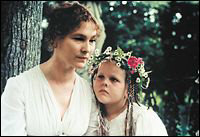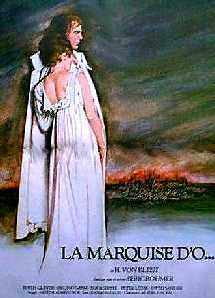 DIE MARQUISE VON O...
DIE MARQUISE VON O...
Eric Rohmer. FRG 1976. - 107 min
Also known as: La Marquise d'O...; The Marquise of O
Screenplay: Eric Rohmer
Based on: Heinrich von Kleist
Cinematography: Néstor Almendros
Cast:
Edith Clever (Marquise),
Bruno Ganz (Le comte),
Peter Lühr (le Colonel, père de la Marquise),
Edda Seippel (la mère de la Marquise),
Bernard Freyd (Leopardo),
Otto Sander (le frère)
Synopsis:

In the 18th century, in a town in northern Italy, the widowed Marquise von O lives with her father, a Colonel, and mother. When their house is attacked by Russian troops, the Marquise is rescued by a Russian Count. A short time later, the Count asks to marry the Marquise, but, at her father’s insistence, she puts him off until he returns from a visit to Naples. Meanwhile, the Marquise discovers that she is pregnant but has no recollection of having had contact with any man. Rejected by her parents, she is compelled to place an advertisement in the local paper to invite the father of her unborn baby to reveal himself…
Having completed his acclaimed series of six Moral Tales, Eric Rohmer made this, his first historical film, based on the controversial novel by Heinrich von Kleist. In stark contrast to his subsequent historical film, Percival le Gallois, Die Marquise von O... is made in the realist tradition, with authentic-looking sets and great attention to period detail. The film was even made in German (although a version dubbed in French exists), the only one of Rohmer’s films to date not to have been made in his native language. In many ways, Die Marquise von O... can be viewed as a continuation of the Moral Tales series. Its central plot hinges around a moral dilemma for each of its principal protagonists. First, how can the man who made the Marquise pregnant without her knowing reveal himself without bringing disgrace on both himself and the woman he loves? Second, how is the Marquise to react when she finds herself pregnant with no knowledge of how it could have come about? Rohmer skilfully portrays the anguish that both characters endure as they struggle to make sense of their predicament and navigate a course through the maelstrom of prejudice and accepted conventions of their time. The inevitable happy ending in von Kleist’s novel is less certain in Rohmer’s film, and Rohmer even goes so far as to introduce elements (such as another possible father for the Marquise’s child) to make the outcome less predictable.
The film is a near-faultless piece of Rohmeresque drama, beautifully written and with compelling performances, particularly from Edith Clever and Bruno Ganz. Indeed, the film’s overall quality makes it easy to forgive Rohmer his indulgences, such as the display of histrionics from the Marquise’s mother and father. Rohmer can himself be glimpsed briefly near the start of the film – he appears as a Russian soldier in one if his very rare film appearances. The film earned Rohmer the Grand Prix spécial du Jury at Cannes in 1976.
Literatur
Screenplay: La Marquise d'O ..., in: L'Avant-Scène Cinéma Nr. 173
Crisp, C. G., Eric Rohmer, Realist and Moralist. Bloomington/Indianapolis 1988
Rohmer, Eric, The Taste for Beauty. Cambridge 1989.
